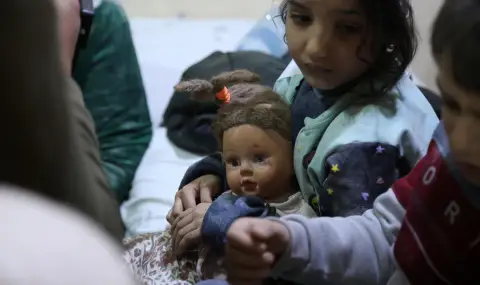Despite the dire situation in Aleppo, until a few days ago, the Franciscan monks in the Syrian city were planning a Christmas celebration in their monastery. The celebrations were to be held under the motto "Hope", ARD reports. But celebrations seem increasingly impossible.
Church service during war
First, rebel Islamist militias quickly established control in the Aleppo region, and then Assad's forces, supported by Russia, responded by bombing rebel targets in northern Syria.
After the Franciscans held their service on Sunday, the fighting also reached their monastery and its educational center. “Thank God, no one was injured or killed”, Matthias Meyer, head of the Franciscan Order's charity organization, told the German public-law media. However, a fire destroyed parts of the monastery's buildings.
The Franciscans are not stopping their charitable work, which has been extremely important for those in need of all ethnicities and religions in Aleppo since the start of the Syrian civil war. The priests prepare food (rice or pasta) in large metal containers and distribute more than 2,000 portions every day. But rising prices due to the war are creating serious challenges. "The price of flour has skyrocketed," explains Meyer.
Rising inflation and insecurity
SOS Children's Villages is also facing financial difficulties, says the organization's head, Lana Idris, who maintains constant contact with her colleagues in Syria.
The SOS Children's Villages buildings in Aleppo are taking care of more than 100 children, many of whom are orphans. When the jihadist offensive began, they did not have time to evacuate. "It is difficult to send money to the isolated place now, although we currently need more financial resources on the ground due to the exploding inflation fueled by the fighting," Idris told ARD.
Charities do not know what the new authorities in Aleppo will think of them. Lana Idris from "SOS Children's Villages" hears from Syria that so far they have been "relatively friendly with the civilian population", but it is not clear how long this will continue. In front of the media, the Catholic bishop of Aleppo, Hana Jalouf, commented that the Islamist group "Hayat Tahrir al-Sham" has not banned the celebration of Christmas. Religious symbols have not been removed either. "They have provided us with electricity, light and water. "We hope everything goes well," Jalouf added.
Help is needed more than ever
Other organizations, however, have had to limit their work because of the attacks. One of them is CARE Deutschland, which has been supplying areas under the control of the Assad opposition with medicine and other essential products since the beginning of the civil war. "Employees of our partner organizations have been killed. In some places we have had to withdraw our colleagues and stop working," the organization's secretary general, Karl-Otto Zentel, told ARD. He is also worried about the displaced people: "Some families are fleeing for the third or fourth time. They have lost everything."
At the same time, NGOs are suffering from an increasingly serious shortage of resources, and the international community is not sending enough support. "Some programs in northern Syria had already had to be stopped," says Zentel. At the same time, the fighting has led to water supply restrictions in some places. "This is especially important now that winter is approaching and warm food and drinks are needed," says the secretary general of CARE Deutschland.
The employees of the "SOS Children's Villages" in Aleppo will not evacuate for the time being. "We are holding on", says Lana Idris.
The Franciscans also want to continue delivering food, even if the journey to the markets in Aleppo is becoming longer and more dangerous. "Our brothers on the ground have decided not to go out into the streets, filled with fear," says Matthias Meyer.
Author: Matthias Ebert (ARD)
